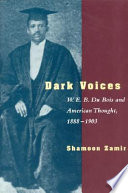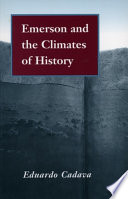 Why should not we also enjoy an original relation to the universe ? Why should not we have a poetry and philosophy of insight, and not of tradition, and a religion by revelation to us, and not the history of... Why should not we also enjoy an original relation to the universe ? Why should not we have a poetry and philosophy of insight, and not of tradition, and a religion by revelation to us, and not the history of...  Nature: Addresses, and Lectures - Page 11by Ralph Waldo Emerson - 1883 - 315 pagesFull view Nature: Addresses, and Lectures - Page 11by Ralph Waldo Emerson - 1883 - 315 pagesFull view - About this book
 | 1903 - 912 pages
...influence Emerson has exerted through •his call to look at all reality immediately, at first hand. "The foregoing generations beheld God and nature face to face ; we through their eyes. Why xshould not we also enjoy an original relation to the universe ? " Again, he says, " Yourself a newborn... | |
 | Bernard M. G. Reardon - 1966 - 420 pages
...originality, in thought and experience, cultivated. 'The foregoing generations," he wrote in Nature, 'beheld God and Nature face to face; we, through their...also enjoy an original relation to the Universe?' And again, 'In the soul let redemption be sought. Refuse the good models, even those which are sacred... | |
 | Kenneth Burke - 1966 - 534 pages
...the city of God which had been shown! (This passage presumably refers to a spot in the Introduction: "The foregoing generations beheld God and nature face to face: we, through their eyes." And at that point, of course, one might turn aside to mention the favored role of eye-imagery in Emerson's... | |
 | Shamoon Zamir - 1995 - 316 pages
...perfect is come," then we shall see "face to face" (i Cor. 13:10, 12). Emerson, however, argues that "the foregoing generations beheld God and nature face to face; we through their eyes," and asks "Why should not we also enjoy an original relation to the universe?"53 The prophet of the... | |
 | Laura Dassow Walls - 1995 - 318 pages
...both Locke and the transcendentalists meant to clear the ground for a new start. As Emerson asked, "Why should not we also enjoy an original relation to the universe?" (CW 1:7). Locke's Essay is permeated by a heady anti-authoritarianism and a demand that men think for... | |
 | W. Clark Gilpin - 1996 - 248 pages
...sides. It is the very rare American scholar who actually delivers an answer to the Emersonian question "Why should not we also enjoy an original relation to the universe?" But despite these caveats, James's central point remains, that the world described is always our world,... | |
 | Jay Parini - 1997 - 294 pages
...in the root sense of the word) and intimate relation to the silence. In Nature, Emerson says, "Our age is retrospective. It builds the sepulchres of...nature face to face; we, through their eyes. Why should we not also enjoy an original relation to the universe?" Perhaps the greatest irony of poetry, and... | |
 | Richard E. Wentz - 1997 - 180 pages
...individual—his escape from history. In the midst of a people without history, Emerson could still say: Our age is retrospective. It builds the sepulchres of...biographies, histories and criticism. The foregoing generation beheld God and nature face to face; we, through their eyes. Why should not we also enjoy... | |
 | Eduardo Cadava - 1997 - 276 pages
...reinforce and expand my discussion of his reading of Webster's speech. Nature's fourth sentence — "The foregoing generations beheld God and nature face to face; we through their eyes" — alludes to I Corinthians 13: 9-13: "When I was a child, I spake as a child, I understood as a child,... | |
 | Joachim Wolschke-Bulmahn - 1997 - 296 pages
...basic tenets. He said that earlier generations beheld "God and Nature face to face."29 He then asked "[w]hy should not we also enjoy an original relation to the universe?" A closer relationship to nature, however, would have its benefits at various levels. In the final analysis... | |
| |